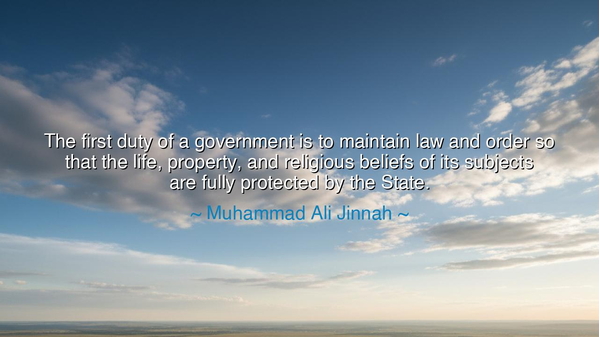
The first duty of a government is to maintain law and order so
The first duty of a government is to maintain law and order so that the life, property, and religious beliefs of its subjects are fully protected by the State.






The words of Muhammad Ali Jinnah, founder of Pakistan and architect of a new nation’s moral foundation, resound with the clarity of timeless wisdom: “The first duty of a government is to maintain law and order so that the life, property, and religious beliefs of its subjects are fully protected by the State.” This declaration, though spoken amid the turbulence of history, belongs to all ages and all nations. It is the voice of a leader who understood that without justice and security, liberty itself becomes hollow—a dream unguarded by the sentinels of order. Jinnah, known as the Quaid-e-Azam, spoke not as a ruler seeking power, but as a father seeking peace for his children.
At its heart, this quote proclaims that the foundation of civilization is order rooted in justice. Every government, before it builds schools, before it raises armies, before it writes constitutions, must first secure the basic sanctity of human life. Without safety, freedom is an illusion; without law, rights are mere words. To Jinnah, the State’s sacred obligation was to be both guardian and protector—to ensure that no man’s faith, labor, or life should be trampled by chaos or tyranny. His vision was not of domination, but of dignity: a state strong not by fear, but by the trust it earned from its people.
The origin of these words lies in one of history’s most turbulent births—the creation of Pakistan in 1947. As millions crossed borders drawn in blood, Jinnah faced not only the challenge of founding a nation, but of calming a tempest of grief, fear, and revenge. His words were a call for restraint, for law and order amid the fires of partition. He sought to remind both rulers and the ruled that a nation born in pain could survive only through justice. A government that failed to protect its citizens from violence, he warned, betrayed its most sacred trust. Thus, his message was both a command and a prayer—that in this new homeland, the rights of every soul, regardless of creed or class, would be protected under the shadow of the law.
History offers countless lessons that echo Jinnah’s truth. When law and order crumble, the very soul of a nation begins to decay. Consider the fall of the Roman Republic, once the greatest experiment in civic governance. As corruption spread, and leaders placed ambition above justice, the Republic dissolved into chaos and civil war. Rome did not fall to an enemy from without—it was undone by the loss of order within. Centuries later, the same pattern repeated itself across empires and revolutions: where governments failed to protect life and liberty, tyranny or anarchy rose in their place. Thus, Jinnah’s warning endures as an eternal law of civilization itself: without justice, there can be no peace; without peace, there can be no freedom.
But Jinnah’s vision reaches beyond mere stability. Law and order are not meant to silence the people, but to empower them—to create a realm where every citizen may live, believe, and work without fear. A just state is not a prison of rules, but a sanctuary of rights. In such a nation, the farmer tills his land without fear of theft, the worshipper prays without dread of persecution, and the merchant trades knowing that his labor will not be taken in vain. This harmony between citizen and state, between duty and protection, is the true mark of greatness in governance. To maintain order without oppressing freedom—that is the art and soul of leadership.
Yet these words also carry a solemn warning to rulers. Power, though necessary, is perilous. The government that neglects justice becomes its own enemy; the ruler who disregards his people’s safety for ambition sows the seeds of his downfall. When leaders forget that their first duty is protection—not privilege—they transform the temple of the state into a throne of corruption. Jinnah’s words therefore remind every leader, ancient or modern, that authority is not a crown, but a burden of service. The hand that governs must first be the hand that shields.
The lesson, then, is simple and eternal: the measure of any government is the peace of its people. A nation’s greatness is not written in its armies or monuments, but in its ability to ensure that every citizen, from the humblest to the highest, lives free from fear. Let rulers remember that their laws must be just, and let citizens remember that their freedom must be guarded through vigilance, not neglect. For the preservation of law is not the work of the state alone—it is the shared duty of every conscience.
So let these words of Muhammad Ali Jinnah be passed down through generations like a torch: The first duty of government is not wealth, nor conquest, nor pride—it is protection. When the state stands as guardian of peace, the people become the builders of progress. When justice is upheld, faith and prosperity bloom together. And when life and belief are safeguarded by law, the nation itself becomes what Jinnah dreamed it to be—a sanctuary of peace, dignity, and unity under God.






AAdministratorAdministrator
Welcome, honored guests. Please leave a comment, we will respond soon